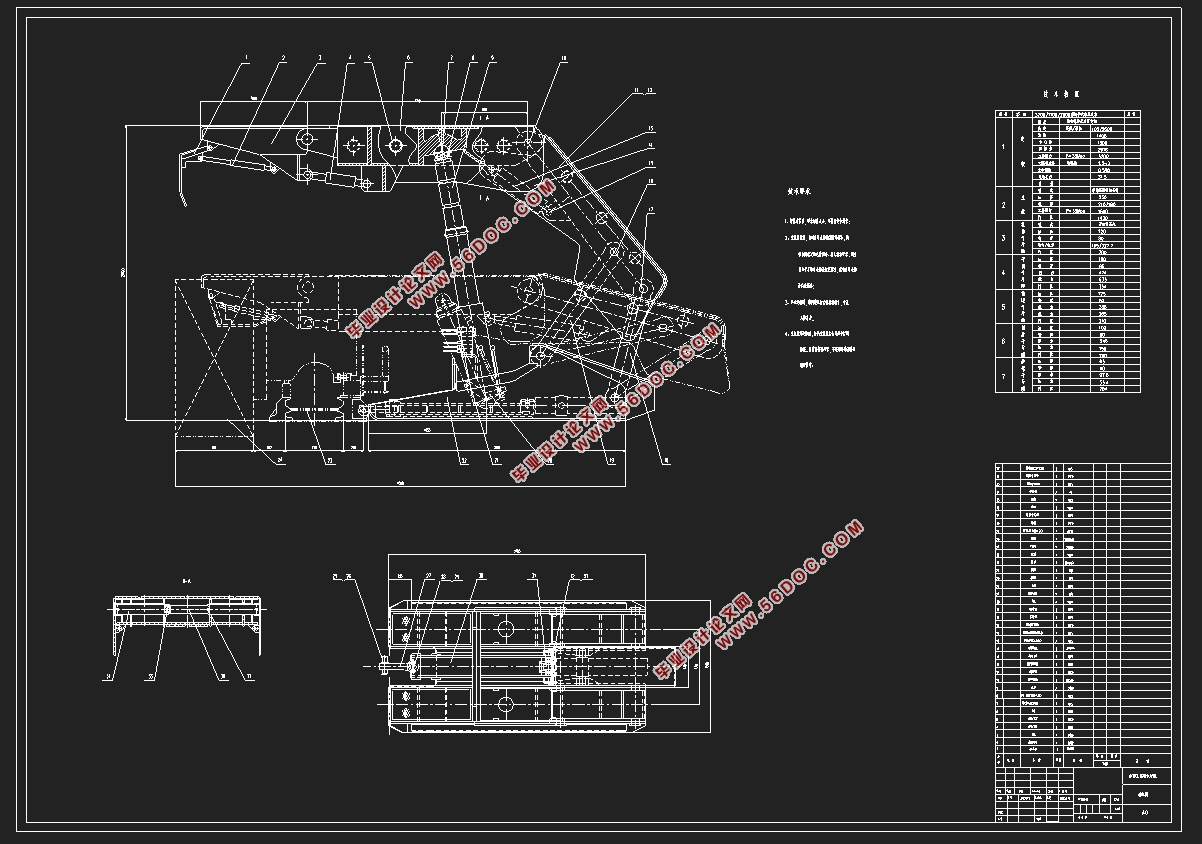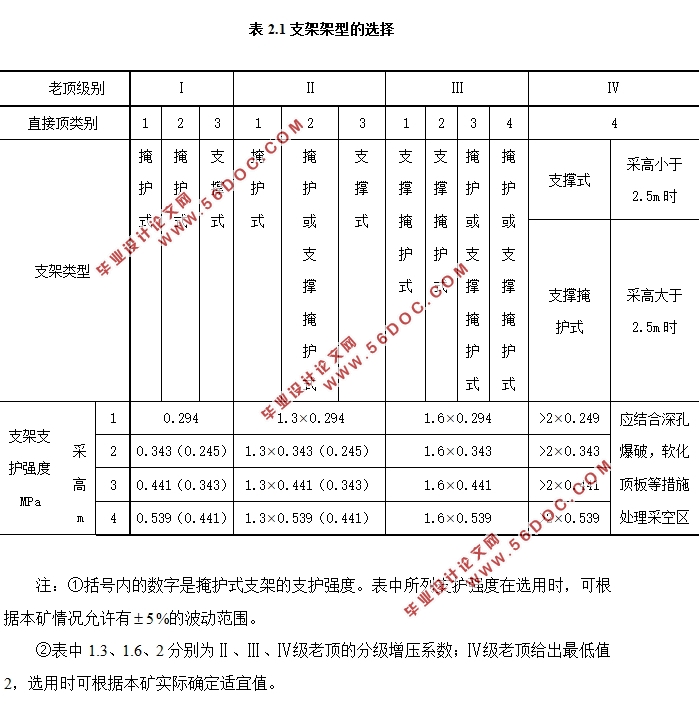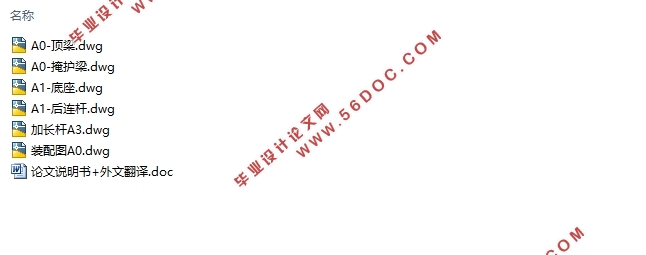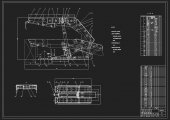掩护式液压支架的设计(含CAD零件图装配图)(论文说明书28000字,外文翻译,CAD图6张)
摘 要
本课题主要论述了液压支架的主要设计过程。其中包括:液压支架的选型、总体设计、主要零部件的设计、校核以及液压系统设计。[1]
支架的样式为掩护式支架。支架除了要有效的对顶板实行有效支撑,还要达成升、降、推移四个步骤。支架选用四连杆机构,改进支架的受力情况,减少支架的升降进程中顶梁前端前后移动的距离。立柱选用单伸缩液压缸,前端带有加长杆,以满足支架最低及最高位置时的高度条件。顶梁掩护梁、底座都做成箱体结构用钢板焊接而成。[2]
在研制液压支架时,需要对支架实行生产考查和分析讨论,选定合理的液压支架受力参数、运动参数和构造参数,以及选定液压支架最佳计划等方面综合性的科学技术问题。本设计首要从支架的工作原理这手,而后实行总体结构设计以及校核。[1]
关键词:液压支架;顶梁;底座;立柱;结构设计
Design of zy3200 / 11 / 26 shield hydraulic support
ABSTRACT
The article mianly elaborate the hydraulic support design for top-caving. includes: the selection of hydraulic pressure support form, system design, main spar part design and examination of hydraulic system design[1]
The support eliminates must realize effectively carries on the strut to the roof, but also must realize ,to fall, to push, move four steps .the support uses four link motion gears, improves the support the stress condition, reduces the support to rise and full the distance which in the process fort end the top-beam around moves. The column uses the list expansion and contraction hydraulic cylinder, front end has legthens the pole, satisfies the support to be lowest and time the highest position high request. The top-beam, shields Liang, the foundation all makes the packed in a box body structure, becomes with the steel plate welding.[2]
At research to presses the support, need to carry on produce to experiment and analyze the research, make sure reasonable of liquid presses the support to be subjected to the dint parameter, the sport parameter and the structure parameters, and make selection the liquid to press the synthetic science technique problem of aspect of etc. of the best project of support. This design mainly this hand from the work principle of the support, then carry on the total structure design and school pits.[1]
Keyword: Hydraulic pressure support;Top beam;Cradle;the column-type support;structure desig



目 录
摘要 ⅰ
ABSTRACT ⅱ
1 绪论 1
1.1 国内外液压支架的研究现状及发展 1
1.2 本课题的研究目的和意义 2
2 液压支架基本理论分析 4
2.1 液压支架的工作原理 4
2.1.1 支架升降 4
2.1.2 支架推移 4
2.1.3 支架承载过程 5
2.2 液压支架的类型和结构 6
2.2.1 支撑式支架 6
2.2.2 掩护式支架 7
2.2.3 支撑掩护式支架 7
2.2.4 特种液压支架 7
2.3 对液压支架的基本要求 8
2.4 支架的选型设计 8
2.4.1 设计的原始条件 8
2.4.2 支架的支护性能与外载荷 8
2.4.3 影响架型选择的因素 9
2.4.4 支架架型的确定 10
3 液压支架的整体结构设计 12
3.1 支架高度、中心距的确定 12
3.1.1 支架高度的确定 12
3.1.2 支架伸缩比 12
3.1.3 支架间距 13
3.2 底座长度的确定 13
3.2.1 底座长度 13
3.2.2 底座宽度 13
3.3 四连杆机构的设计 14
3.3.1 四连杆机构的作用与缺点 14
3.3.2 四连杆几何特征 14
3.3.3 四连杆机构各部尺寸的确定 15
3.4 顶梁长度计算 19
3.4.1 支架工作方式对顶梁长度的影响 19
3.4.2 顶梁长度计算 19
4 支架主要部件的设计 21
4.1 支架主要部件的设计要求 21
4.2 顶梁的设计 22
4.3 底座的设计 23
4.3.1 液压支架的底座 23
4.4 支架技术参数和立柱的设计 23
4.4.1 支护面积 23
4.4.2 支护强度 24
4.4.3 确定立柱的技术参数 24
4.4.4 安全阀压力与立柱工作阻力的确定 25
4.4.6 支护效率 28
4.4.7 底座接触比压 28
4.5 立柱柱窝位置和受力计算 29
4.5.1 立柱布置 29
4.5.2 立柱柱窝位置的确定 29
4.6 千斤顶技术参数的确定 30
4.6.1 推移千斤顶 30
4.6.2 平衡千斤顶在顶梁上位置的确定 31
4.6.3 侧推千斤顶位置的确定 34
5 支架受力分析与计算 36
5.1 支架工作状态 36
5.1.1 顶板状态 36
5.1.2 支架工作状态 36
5.1.3 支架受力 36
5.2 受力计算 37
5.3 顶梁载荷分布 40
6 液压支架的强度校核 42
6.1 强度条件 42
6.2 主顶梁的校核 42
6.2.1 主顶梁的弯距计算 42
6.2.2 主顶梁的强度计算 43
6.2.3 安全系数 44
6.3 掩护梁强度校核 45
6.3.1 掩护梁受力情况 45
6.3.2 掩护梁强度计算 45
6.3.3 安全系数 46
6.4 底座强度校核 46
6.4.1 底座受力情况 46
6.5 立柱强度校核 50
6.5.1 预算缸筒内径和缸壁厚度 50
6.5.2 计算重叠长度 51
6.5.3 各段的弯矩 53
6.5.4 加长杆强度核算 54
6.5.5 活柱强度核算 55
6.5.6 缸体强度核算 56
6.5.7 立柱的稳定裕量验算 57
7 液压系统设计 58
7.1 液压支架的液压系统特点 58
7.2 液压系统的设计方法 58
7.3 千斤顶系统 59
7.3.1. 侧推、调架、防倒系统 59
7.3.2. 推移千斤顶系统 59
7.3.3. 平衡千斤顶系统 60
7.3.4. 活动侧护板控制方式 60
7.4 乳化液泵站系统 62
7.4.1 乳化液泵站 62
7.4.2 泵站液压系统 62
7.4.3 乳化液泵站的元部件 65
8 技术经济分析 67
9 结论 68
参考文献 69
外文文献 70
中文译文 75
致谢 80
|







